|
|
|
Sort Order |
|
|
|
Items / Page
|
|
|
|
|
|
|
| Srl | Item |
| 1 |
ID:
188188
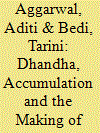

|
|
|
|
|
| Summary/Abstract |
In this paper, our main objective is to pay attention to social and material accumulations in a form of self-employed work practised by non-elites in the Indian city of Mumbai, which they call dhandha. Using ethnographic examples of two working-class, urban dhandhas—taxi-driving and vending—we suggest that thinking with the concept of dhandha and other conceptions of value and relationality that people associate with this kind of work helps us rethink and open up more abstract and universal conceptualisations of accumulation. We examine not just how much accumulation occurs but also who the various actors are in making accumulation possible; what gets accumulated and how; and why even burdensome accumulations are considered valuable and are intentionally pursued and embraced. As ethnographers who conducted our work in several of Mumbai’s many languages, we pay attention to the specific words and concepts used by our interlocutors to describe their work and their economic relations and argue that dhandha in Mumbai is not just work, it is also a way of making valuable lives and navigating the world.
|
|
|
|
|
|
|
|
|
|
|
|
|
|
|
|
| 2 |
ID:
188184
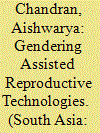

|
|
|
|
|
| Summary/Abstract |
Literature on commercial surrogacy argues that assisted reproduction technologies (ARTs) problematise presumed essentialist dichotomies of nature and culture. While technologies of commercial surrogacy naturalise the medicalisation of the body, these technologies in turn also produce new knowledge about the biological facts of the body. In what ways are knowledge about reproductive labour and women’s reproductive capacities embedded in these technologies? How do these technologies invite us to imagine maternal bodies? Under regimes of stratified reproduction that inflect reproductive bodies with caste, class and racial politics, how do we read the production of the gendered body within commercial gestational surrogacy practices? The paper draws on ethnographic research conducted in Mumbai to study how technologies of commercial surrogacy interact with the normative idioms of conception. I will attempt to show how assumptions about gendered bodies and gendered roles are embedded within the material teleologies of these technologies, which in turn produce newer material-semiotic significations of the reproductive body.
|
|
|
|
|
|
|
|
|
|
|
|
|
|
|
|
| 3 |
ID:
188190
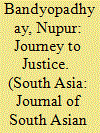

|
|
|
|
|
| Summary/Abstract |
Ramnath Biswas (1894–1955) independently travelled around the world on a bicycle between 1931 and 1940. His travelogues about Africa and the US reveal Biswas to be an active supporter of the nascent transnational civil rights movement. This article connects his endeavours to achieve social justice for African, African American and Asian people with the phenomenon of ‘coloured cosmopolitanism’. Biswas’ observations—in particular, his portrayal of racial dynamics between Indians and Africans—are striking. Exploring Biswas’ narratives from a micro-historical perspective allows us to envision an alternative history of solidarity between non-white (‘oshwet’) people and to place his journey at the intersection of Indian Ocean Studies and studies of transnational civil rights activities during the inter-War period.
|
|
|
|
|
|
|
|
|
|
|
|
|
|
|
|
| 4 |
ID:
188189
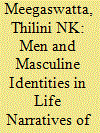

|
|
|
|
|
| Summary/Abstract |
Located at the intersections of men, masculinity, violence and narrative in the context of conflict-ridden South Asia, this study critically reads the configurations of men and masculinity in a selection of life narratives that revolve around Sri Lanka’s Eelam war (1983–2009). Based on the premise that hegemonic masculine identities shaped and interpellated by statist narratives in times of war are likely to have long-term detrimental impacts on societies, this paper considers life narratives that bring to life specific individual truths as alternative archives that could be sites of interruption, subversion and alternative imagination. This paper offers a critical feminist reading of the configurations of masculinities in Rohini Mohan’s The Seasons of Trouble (2014) and Ajith Boyagoda and Sunila Galappatti’s A Long Watch (2016), and explores the complex interactions among masculinity and violence that subvert dominant framings of men and masculinity and thereby help resist post-war patriarchal political revivals.
|
|
|
|
|
|
|
|
|
|
|
|
|
|
|
|
| 5 |
ID:
188182


|
|
|
|
|
| Summary/Abstract |
This paper problematises the dominance of the Northern gaze on sex work. Because the organisation of sex work takes place under different modes in Bangladesh, sex work premises have a unique structure which sets them apart from sex work in the Global Northern contexts. In particular, the dichotomy between private and public life, which has influenced the structure and organisation of sex work in many Northern contexts, as well as the regulation of sex work, is less pronounced in the Bangladeshi context. By documenting the culturally distinct and varied experiences of regional sex workers in Bangladesh, this paper emphasises the diversity among sex workers and argues that ignoring the culturally-specific conditions of the organisation of sex work risks universalising sex workers as perpetual victims. This paper highlights the importance of acknowledging the cultural variability of sex work to understand the diversity of sex workers’ experiences.
|
|
|
|
|
|
|
|
|
|
|
|
|
|
|
|
| 6 |
ID:
188187
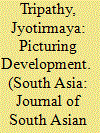

|
|
|
|
|
| Summary/Abstract |
The paper engages with the world of outdoor election campaign materials (posters, banners and billboards) and their ways of establishing developmental truths during India’s general election of 2019. Offering a content analysis as well as their discursive production, the paper seeks to understand how these materials commissioned by the Biju Janata Dal (BJD) and the Bharatiya Janata Party (BJP) are loaded with development metaphors even while differing from each other in the conception and delivery of development. Contrary to the commonly held belief that posters and banners are the prehistory of election campaigning, it is proposed that they are more democratic and participatory, and so a treasure trove of developmental meaning-making. Going beyond the delivery of messages through the textual and pictorial elements of visual materials, it is also proposed that their presence and abundance signify in ways not easily appreciated.
|
|
|
|
|
|
|
|
|
|
|
|
|
|
|
|
| 7 |
ID:
188183
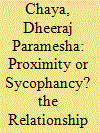

|
|
|
|
|
| Summary/Abstract |
Scholars of Intelligence Studies have extensively debated the contours of an ideal relationship between intelligence services and policy making, in which agencies can maintain analytical objectivity while having a policy impact. However, this debate has not meaningfully embraced a geographic expanse covering the Global South. This article, firstly, addresses this by offering a comprehensive analysis of the intelligence–policy relationship in India during the Nehruvian era. Secondly, it draws on the existing scholarly examinations of the global intelligence–policy relationships and argues that ‘proximity’ produces varying results in different decision-making cultures. Thirdly, the article contributes to the literature on contemporary Indian security by examining the impact on Indian intelligence of the relationship between Prime Minister Jawaharlal Nehru and B.N. Mullik, former chief of Indian intelligence and an understudied personality. It challenges the popular perception surrounding Mullik’s ‘sycophancy’ and argues that the decision-making culture that existed during the Nehruvian years demanded greater proximity, subservience and, in the worst case, sycophancy. A cost-benefit analysis presented in the article reveals that there were both pros and cons to the ‘proximity’ factor, with the former being more significant.
|
|
|
|
|
|
|
|
|
|
|
|
|
|
|
|
| 8 |
ID:
188185
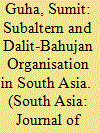

|
|
|
|
|
| Summary/Abstract |
This article analyses the history of Marathi-speaking India after 1600 in order to understand why Dalit and Bahujan movements first arose in this region before spreading across South Asia. It argues that this was an explicable consequence of a tradition of social action long extant at the village and supra-village levels—that self-organisation had been yoked to hegemonic power, but not thereby erased. I then invoke Antonio Gramsci’s concept of subalterns as subordinated fractions of a larger whole to analyse this phenomenon. Finally, I trace the breaks and continuities that enabled the leadership of Jyotirao Phule and B.R. Ambedkar.
|
|
|
|
|
|
|
|
|
|
|
|
|
|
|
|
| 9 |
ID:
188186


|
|
|
|
|
| Summary/Abstract |
In the increasingly urgent public debates on India’s democracy, the Emergency (1975–77) is emerging as an important interpretative site: an exceptionally violent episode marked as a one-off crisis that also allows for an ongoing renegotiation of a modern Indian polity and culture. Manohar Malgonkar’s The Garland Keepers (1980), a little-known, fast-paced and highly entertaining political spy thriller, provides one entry point to situate the Emergency within its larger geopolitical and historical contexts of colonial rule, Partition, the Cold War and India–Pakistan relations. The article demonstrates that the crisis of the Emergency functions simultaneously as exceptional and non-exceptional, unexpected and yet familiar. Attention to narrative form and the various genealogies of the spy thriller and in India allow for an exploration of the relationship between genre and politics. I argue that even popular genres carry political meaning, revealing the tense negotiations between crisis and continuity, ultimately critiquing both the one-off Emergency and the iterative emergency of ongoing corruption.
|
|
|
|
|
|
|
|
|
|
|
|
|
|
|
|
|
|
|
|
|